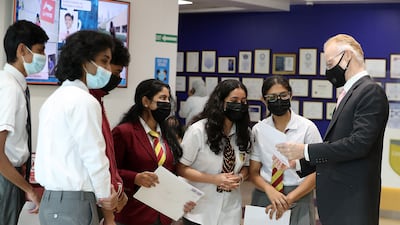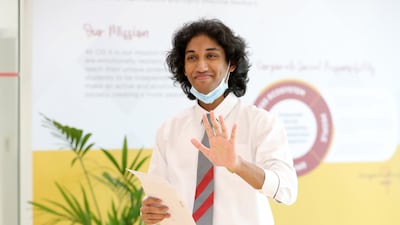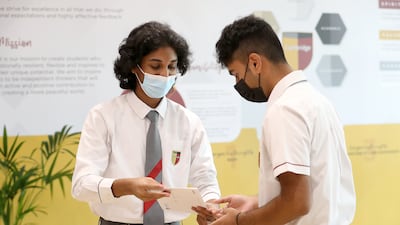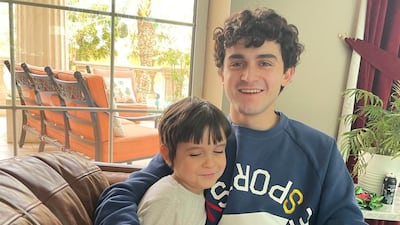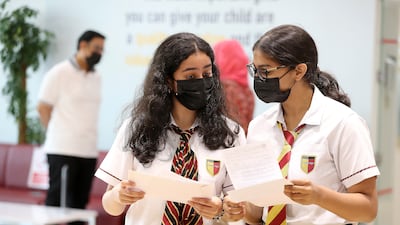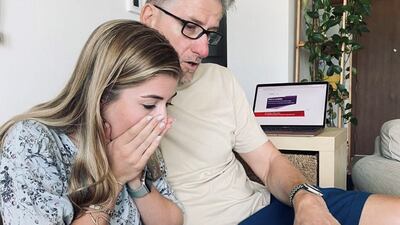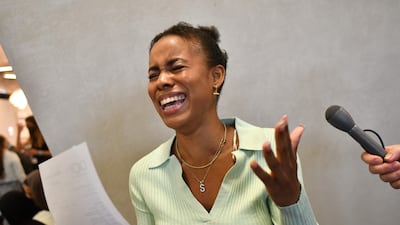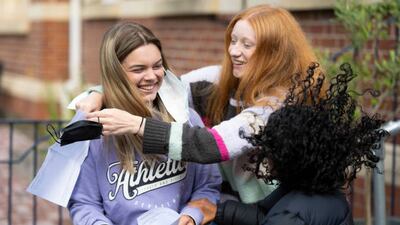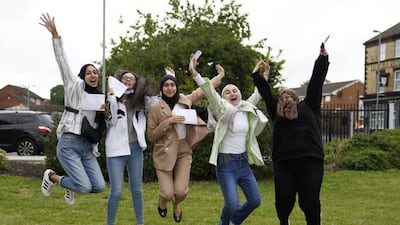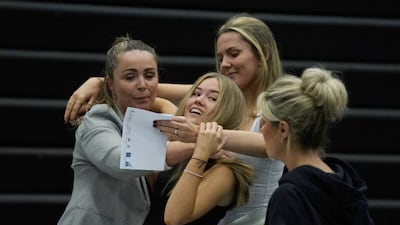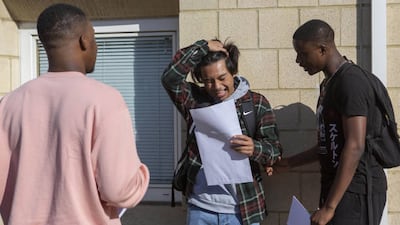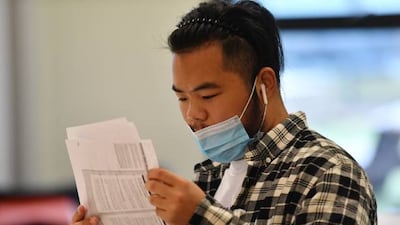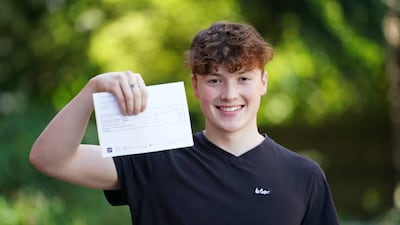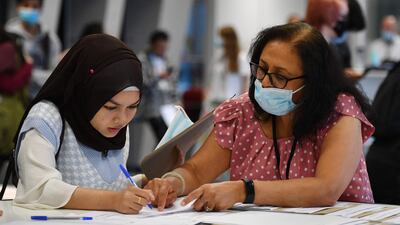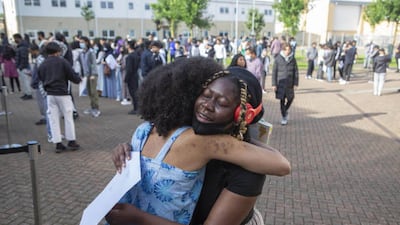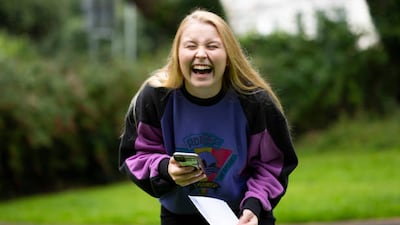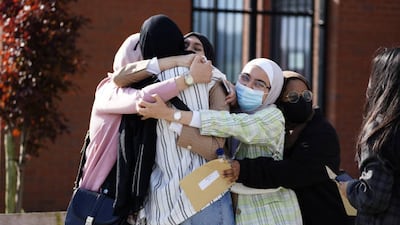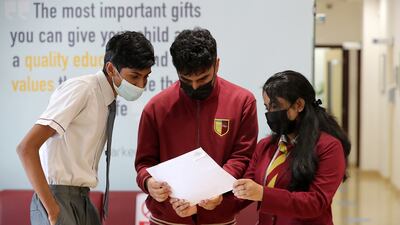Schools in the UAE reported record A-level results this year, as pupils were awarded teacher-assessed grades in the absence of examinations.
Tests were cancelled for the second year running owing to the pandemic, and instead teachers used a combination of coursework, mock exams and essays to determine grades.
Teenagers in the UK also achieved record results, with 44.8 per cent getting A* or A grades, but British experts expressed caution that many of these results may be inflated.
The concerns of pumped-up grades have been echoed by teachers in the UAE.
Mark Leppard, headmaster at The British School Al Khubairat in Abu Dhabi, had one explanation for why the results were better than normal.
“There has been a grade inflation and the explanation for that is borderline pupils. The teachers would be asked if the pupil would achieve an A or a B, for example,” he said.
Staff would be more likely to give the pupil an A than a B, whereas if the pupil had sat the exam, he or she could have received either grade, depending on performance.
“As a consequence, last year and this year, the results are slightly inflated,” he said.
The school did take steps to remove bias and to ensure pupils were awarded accurate results.
Pupils’ names were removed from exam papers to maintain anonymity, and six or seven levels of checks were put in place, with several teachers and the headteacher looking at grades before they were sent to the boards.
Furthermore, evidence of each pupil’s achievement was set in place before exams were cancelled, and the school used standard mock exams papers for internal tests so that the difficulty level was consistent.
At Dubai British School Emirates Hills, the results were better than in previous years.
This year, 86 per cent of the A-level results at the school were between A* and B, compared with 78 per cent in 2020, 70 per cent in 2019, 67 per cent in 2018 and 61 per cent in 2017.
BTEC diploma results at the school also improved consistently, with 81 per cent of entries securing A* to B in 2021 compared to 55 per cent in 2016.
Sinead Kehoe, head of secondary at Dubai British School Emirates Hills, said the school gathered evidence over two years to determine their pupils’ grades.
Teenagers’ portfolios were assessed, their coursework for BTEC was externally validated and candidates’ names were removed from exam papers.
“I think that the quality assurance was as fair as it could possibly be. As a school, we have had professional training for teachers on objectivity,” she said.
Sama Salman, 18, a British pupil at Brighton College Abu Dhabi, had initial reservations about teacher-assessed grading.
“I felt sometimes it was harder to show your potential to the teachers throughout the year,” she said.
“I was worried some people would end up getting grades they would prefer because of teacher favouritism.
“It was less standardised and there could be bias.”
In the end, however, she said teacher-assessed grades worked out well.
Lexus LX700h specs
Engine: 3.4-litre twin-turbo V6 plus supplementary electric motor
Power: 464hp at 5,200rpm
Torque: 790Nm from 2,000-3,600rpm
Transmission: 10-speed auto
Fuel consumption: 11.7L/100km
On sale: Now
Price: From Dh590,000
COMPANY PROFILE
Name: Kumulus Water
Started: 2021
Founders: Iheb Triki and Mohamed Ali Abid
Based: Tunisia
Sector: Water technology
Number of staff: 22
Investment raised: $4 million
Biography
Favourite drink: Must have karak chai and Chinese tea every day
Favourite non-Chinese food: Arabic sweets and Indian puri, small round bread of wheat flour
Favourite Chinese dish: Spicy boiled fish or anything cooked by her mother because of its flavour
Best vacation: Returning home to China
Music interests: Enjoys playing the zheng, a string musical instrument
Enjoys reading: Chinese novels, romantic comedies, reading up on business trends, government policy changes
Favourite book: Chairman Mao Zedong’s poems
Company%20Profile
%3Cp%3E%3Cstrong%3ECompany%3A%3C%2Fstrong%3E%20Astra%20Tech%3Cbr%3E%3Cstrong%3EStarted%3A%20%3C%2Fstrong%3EMarch%202022%3Cbr%3E%3Cstrong%3EBased%3A%20%3C%2Fstrong%3EDubai%3Cbr%3E%3Cstrong%3EFounder%3A%20%3C%2Fstrong%3EAbdallah%20Abu%20Sheikh%3Cbr%3E%3Cstrong%3EIndustry%3A%3C%2Fstrong%3E%20technology%20investment%20and%20development%3Cbr%3E%3Cstrong%3EFunding%20size%3A%3C%2Fstrong%3E%20%24500m%3C%2Fp%3E%0A
COMPANY%20PROFILE
%3Cp%3E%3Cstrong%3ECompany%20name%3A%3C%2Fstrong%3E%20Alaan%3Cbr%3E%3Cstrong%3EStarted%3A%3C%2Fstrong%3E%202021%3Cbr%3E%3Cstrong%3EBased%3A%3C%2Fstrong%3E%20Dubai%3Cbr%3E%3Cstrong%3EFounders%3A%3C%2Fstrong%3E%20Parthi%20Duraisamy%20and%20Karun%20Kurien%3Cbr%3E%3Cstrong%3ESector%3A%3C%2Fstrong%3E%20FinTech%3Cbr%3E%3Cstrong%3EInvestment%20stage%3A%3C%2Fstrong%3E%20%247%20million%20raised%20in%20total%20%E2%80%94%20%242.5%20million%20in%20a%20seed%20round%20and%20%244.5%20million%20in%20a%20pre-series%20A%20round%3Cbr%3E%3Cbr%3E%3C%2Fp%3E%0A
The%C2%A0specs%20
%3Cp%3E%3Cstrong%3EEngine%3A%3C%2Fstrong%3E%20Dual%20synchronous%20electric%20motors%20%20%0D%3Cbr%3E%3Cstrong%3EPower%3A%20%3C%2Fstrong%3E646hp%0D%3Cbr%3E%3Cstrong%3ETorque%3A%20%3C%2Fstrong%3E830Nm%0D%3Cbr%3E%3Cstrong%3ETransmission%3A%20%3C%2Fstrong%3ETwo-speed%20auto%20(rear%20axle)%3B%20single-speed%20auto%20(front)%20%0D%3Cbr%3E%3Cstrong%3EPrice%3A%20%3C%2Fstrong%3EFrom%20Dh552%2C311%3B%20Dh660%2C408%20(as%20tested)%0D%3Cbr%3E%3Cstrong%3EOn%20sale%3A%20%3C%2Fstrong%3Enow%3C%2Fp%3E%0A
Ferrari 12Cilindri specs
Engine: naturally aspirated 6.5-liter V12
Power: 819hp
Torque: 678Nm at 7,250rpm
Price: From Dh1,700,000
Available: Now
Company Fact Box
Company name/date started: Abwaab Technologies / September 2019
Founders: Hamdi Tabbaa, co-founder and CEO. Hussein Alsarabi, co-founder and CTO
Based: Amman, Jordan
Sector: Education Technology
Size (employees/revenue): Total team size: 65. Full-time employees: 25. Revenue undisclosed
Stage: early-stage startup
Investors: Adam Tech Ventures, Endure Capital, Equitrust, the World Bank-backed Innovative Startups SMEs Fund, a London investment fund, a number of former and current executives from Uber and Netflix, among others.
EA Sports FC 26
Publisher: EA Sports
Consoles: PC, PlayStation 4/5, Xbox Series X/S
Rating: 3/5
How to become a Boglehead
Bogleheads follow simple investing philosophies to build their wealth and live better lives. Just follow these steps.
• Spend less than you earn and save the rest. You can do this by earning more, or being frugal. Better still, do both.
• Invest early, invest often. It takes time to grow your wealth on the stock market. The sooner you begin, the better.
• Choose the right level of risk. Don't gamble by investing in get-rich-quick schemes or high-risk plays. Don't play it too safe, either, by leaving long-term savings in cash.
• Diversify. Do not keep all your eggs in one basket. Spread your money between different companies, sectors, markets and asset classes such as bonds and property.
• Keep charges low. The biggest drag on investment performance is all the charges you pay to advisers and active fund managers.
• Keep it simple. Complexity is your enemy. You can build a balanced, diversified portfolio with just a handful of ETFs.
• Forget timing the market. Nobody knows where share prices will go next, so don't try to second-guess them.
• Stick with it. Do not sell up in a market crash. Use the opportunity to invest more at the lower price.
Results:
5pm: Conditions (PA) Dh80,000 1,400m | Winner: AF Tahoonah, Richard Mullen (jockey), Ernst Oertel (trainer)
5.30pm: Handicap (TB) Dh90,000 1,400m | Winner: Ajwad, Gerald Avranche, Rashed Bouresly
6pm: Maiden (PA) Dh80,000 1,600m | Winner: RB Lam Tara, Fabrice Veron, Eric Lemartinel
6.30pm: Handicap (PA) Dh80,000 1,600m | Winner: Duc De Faust, Szczepan Mazur, Younis Al Kalbani
7pm: Wathba Stallions Cup (PA) Dh70,000 2,200m | Winner: Shareef KB, Fabrice Veron, Ernst Oertel
7.30pm: Handicap (PA) Dh90,000 1,500m | Winner: Bainoona, Pat Cosgrave, Eric Lemartinel
Results:
5pm: Maiden (PA) | Dh80,000 | 1,200 metres
Winner: Jabalini, Szczepan Mazur (jockey), Younis Kalbani (trainer)
5.30pm: UAE Arabian Derby (PA) | Prestige | Dh150,000 | 2,200m
Winner: Octave, Gerald Avranche, Abdallah Al Hammadi
6pm: Arabian Triple Crown Round 3 (PA) | Group 3 Dh300,000 | 2,200m
Winner: Harrab, Richard Mullen, Mohamed Ali
6.30pm: Emirates Championship (PA) | Group 1 | Dh1million | 2,200m
Winner: BF Mughader, Szczepan Mazur, Younis Al Kalbani
7pm: Abu Dhabi Championship (TB) | Group 3 | Dh380,000 | 2,200m
Winner: GM Hopkins, Patrick Cosgrave, Jaber Ramadhan
7.30pm: Wathba Stallions Cup (PA) | Conditions | Dh70,000 | 1,600m
Winner: AF La’Asae, Tadhg O’Shea, Ernst Oertel
THE BIO
Born: Mukalla, Yemen, 1979
Education: UAE University, Al Ain
Family: Married with two daughters: Asayel, 7, and Sara, 6
Favourite piece of music: Horse Dance by Naseer Shamma
Favourite book: Science and geology
Favourite place to travel to: Washington DC
Best advice you’ve ever been given: If you have a dream, you have to believe it, then you will see it.
Countries recognising Palestine
France, UK, Canada, Australia, Portugal, Belgium, Malta, Luxembourg, San Marino and Andorra
THE RESULTS
5pm: Maiden (PA) Dh80,000 1,400m
Winner: Alnawar, Connor Beasley (jockey), Helal Al Alawi (trainer)
5.30pm: Maiden (PA) Dh80,000 1,400m
Winner: Raniah, Noel Garbutt, Ernst Oertel
6pm: Handicap (PA) Dh90,000 2,200m
Winner: Saarookh, Richard Mullen, Ana Mendez
6.30pm: Sheikh Zayed bin Sultan Al Nahyan Jewel Crown (PA) Rated Conditions Dh125,000 1,600m
Winner: RB Torch, Tadhg O’Shea, Eric Lemartinel
7pm: Al Wathba Stallions Cup Handicap Dh70,000 1,600m
Winner: MH Wari, Antonio Fresu, Elise Jeane
7.30pm: Handicap Dh90,000 1,600m
Winner: Mailshot, Royston Ffrench, Salem bin Ghadayer
Most%20polluted%20cities%20in%20the%20Middle%20East
%3Cp%3E1.%20Baghdad%2C%20Iraq%3Cbr%3E2.%20Manama%2C%20Bahrain%3Cbr%3E3.%20Dhahran%2C%20Saudi%20Arabia%3Cbr%3E4.%20Kuwait%20City%2C%20Kuwait%3Cbr%3E5.%20Ras%20Al%20Khaimah%2C%20UAE%3Cbr%3E6.%20Ash%20Shihaniyah%2C%20Qatar%3Cbr%3E7.%20Abu%20Dhabi%2C%20UAE%3Cbr%3E8.%20Cairo%2C%20Egypt%3Cbr%3E9.%20Riyadh%2C%20Saudi%20Arabia%3Cbr%3E10.%20Dubai%2C%20UAE%3C%2Fp%3E%0A%3Cp%3E%3Cem%3ESource%3A%202022%20World%20Air%20Quality%20Report%3C%2Fem%3E%3C%2Fp%3E%0A
MOST%20POLLUTED%20COUNTRIES%20IN%20THE%20WORLD
%3Cp%3E1.%20Chad%3Cbr%3E2.%20Iraq%3Cbr%3E3.%20Pakistan%3Cbr%3E4.%20Bahrain%3Cbr%3E5.%20Bangladesh%3Cbr%3E6.%20Burkina%20Faso%3Cbr%3E7.%20Kuwait%3Cbr%3E8.%20India%3Cbr%3E9.%20Egypt%3Cbr%3E10.%20Tajikistan%3Cbr%3E%3Cbr%3E%3Cem%3ESource%3A%202022%20World%20Air%20Quality%20Report%3C%2Fem%3E%3C%2Fp%3E%0A
Teams
Punjabi Legends Owners: Inzamam-ul-Haq and Intizar-ul-Haq; Key player: Misbah-ul-Haq
Pakhtoons Owners: Habib Khan and Tajuddin Khan; Key player: Shahid Afridi
Maratha Arabians Owners: Sohail Khan, Ali Tumbi, Parvez Khan; Key player: Virender Sehwag
Bangla Tigers Owners: Shirajuddin Alam, Yasin Choudhary, Neelesh Bhatnager, Anis and Rizwan Sajan; Key player: TBC
Colombo Lions Owners: Sri Lanka Cricket; Key player: TBC
Kerala Kings Owners: Hussain Adam Ali and Shafi Ul Mulk; Key player: Eoin Morgan
Venue Sharjah Cricket Stadium
Format 10 overs per side, matches last for 90 minutes
Timeline October 25: Around 120 players to be entered into a draft, to be held in Dubai; December 21: Matches start; December 24: Finals
More from Neighbourhood Watch:
RESULT
West Brom 2 Liverpool 2
West Brom: Livermore (79'), Rondón (88' )
Liverpool: Ings (4'), Salah (72')
'Hocus%20Pocus%202'
%3Cp%3EDirector%3A%20Anne%20Fletcher%3Cbr%3E%3Cbr%3EStars%3A%20Bette%20Midler%2C%20Sarah%20Jessica%20Parker%2C%20Kathy%20Najimy%3Cbr%3E%3Cbr%3ERating%3A%203.5%2F5%3C%2Fp%3E%0A
The National's picks
4.35pm: Tilal Al Khalediah
5.10pm: Continous
5.45pm: Raging Torrent
6.20pm: West Acre
7pm: Flood Zone
7.40pm: Straight No Chaser
8.15pm: Romantic Warrior
8.50pm: Calandogan
9.30pm: Forever Young
Recent winners
2002 Giselle Khoury (Colombia)
2004 Nathalie Nasralla (France)
2005 Catherine Abboud (Oceania)
2007 Grace Bijjani (Mexico)
2008 Carina El-Keddissi (Brazil)
2009 Sara Mansour (Brazil)
2010 Daniella Rahme (Australia)
2011 Maria Farah (Canada)
2012 Cynthia Moukarzel (Kuwait)
2013 Layla Yarak (Australia)
2014 Lia Saad (UAE)
2015 Cynthia Farah (Australia)
2016 Yosmely Massaad (Venezuela)
2017 Dima Safi (Ivory Coast)
2018 Rachel Younan (Australia)
THE BIO
Favourite car: Koenigsegg Agera RS or Renault Trezor concept car.
Favourite book: I Am Pilgrim by Terry Hayes or Red Notice by Bill Browder.
Biggest inspiration: My husband Nik. He really got me through a lot with his positivity.
Favourite holiday destination: Being at home in Australia, as I travel all over the world for work. It’s great to just hang out with my husband and family.

